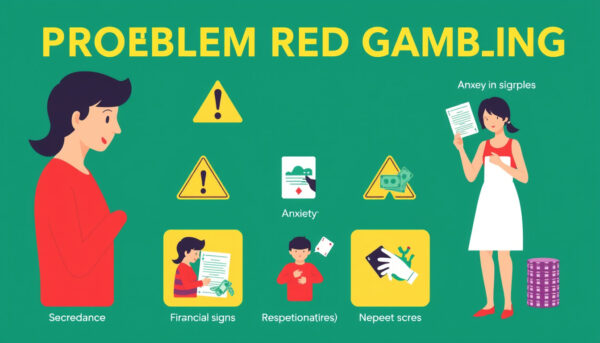Recognizing the Red Flags: Know the Signs of Problem Gambling

Problem gambling, often referred to as gambling addiction or gambling disorder, is a serious condition that can have profound effects on an individual’s life, relationships, and overall well-being. Understanding the signs of problem gambling is crucial for early intervention and help.

What is Problem Gambling?
Problem gambling is characterized by the inability to resist the urge to gamble, leading to significant negative consequences. This may include disruptions in personal relationships, work performance, and financial stability. Unlike substance abuse, visible physical signs may be absent, making it essential to recognize behavioral symptoms.
Signs and Symptoms
Common Warning Signs
-
Preoccupation: Constantly thinking about gambling or planning future gambling activities.
-
Escalating Bets: Needing to gamble with increasing amounts of money to achieve the same thrill.
-
Chasing Losses: Returning to gambling to recover lost money, often leading to even greater losses.
-
Irritability and Restlessness: Feeling anxious or agitated when attempting to reduce or stop gambling activities.
-
Deceitfulness: Lying to family members or friends about gambling habits or financial losses.
-
Isolation: Distancing oneself from friends and family, which may include unexplained absences from work or school.
-
Financial Issues: Borrowing money or committing crimes to finance gambling, resulting in debt accumulation.
-
Emotional Distress: Using gambling as a means to escape stress, anxiety, or depression.
Emotional and Financial Consequences
The emotional toll of problem gambling can be severe, leading to anxiety, depression, and feelings of hopelessness. Financially, compulsive gamblers may face bankruptcy, legal issues, and job loss. The impact extends beyond the individual, affecting families and communities through the ripple effects of gambling-related stress and crises.
Risk Factors
While anyone who gambles can potentially develop a gambling problem, certain factors can increase vulnerability:
- Age: Younger and middle-aged adults are more likely to experience gambling issues, though older adults can also be affected.
- Gender: Men are generally more predisposed to compulsive gambling, although the gap between men and women is narrowing.
- Mental Health: Those with underlying mental health conditions such as depression, anxiety, or substance use disorders have higher susceptibility to problem gambling.
- Family History: A background of gambling problems in the family can increase one’s own risk.
How to Seek Help
If you or someone you know exhibits signs of problem gambling, it’s important to seek support. The following steps can help facilitate treatment:
-
Self-Assessment: Consider taking a gambling self-assessment to gauge the severity of the problem.
-
Professional Help: Reach out to mental health professionals, counselors, or specialized treatment programs aimed at addressing gambling addiction.
-
Support Groups: Participate in groups like Gamblers Anonymous for emotional support from peers who understand the challenges of gambling addiction.
-
Education: Learn about problem gambling to better understand its effects and the support resources available to those affected.
-
Open Communication: Encourage conversations with family members and friends about gambling behaviors and the need for support.
Conclusion
Recognizing the signs of problem gambling is the first step in addressing a potentially devastating condition. By educating yourself and others about the symptoms and implications of problem gambling, you can foster a healthier dialogue and encourage those in need to seek help. Awareness, understanding, and intervention can help restore balance and improve lives affected by gambling addiction. If you or someone you know is struggling, don’t hesitate to reach out to local support services.
